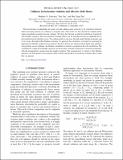Collinear factorization violation and effective field theory
Author(s)
Schwartz, Matthew D.; Yan, Kai; Zhu, HuaXing
DownloadPhysRevD.96.056005.pdf (1.806Mb)
PUBLISHER_POLICY
Publisher Policy
Article is made available in accordance with the publisher's policy and may be subject to US copyright law. Please refer to the publisher's site for terms of use.
Terms of use
Metadata
Show full item recordAbstract
The factorization of amplitudes into hard, soft and collinear parts is known to be violated in situations where incoming particles are collinear to outgoing ones. This result was first derived by studying limits where noncollinear particles become collinear. We show that through an effective field theory framework with Glauber operators, these factorization-violating effects can be reproduced from an amplitude that is factorized before the splitting occurs. We confirm results at one loop, through single Glauber exchange, and at two loops, through double Glauber exchange. To approach the calculation, we begin by reviewing the importance of Glauber scaling for factorization. We show that for any situation where initial-state and final-state particles are not collinear, the Glauber contribution is entirely contained in the soft contribution. The contributions coming from Glauber operators are necessarily nonanalytic functions of external momentum, with the nonanalyticity arising from the rapidity regulator. The nonanalyticity is critical so that Glauber operators can both preserve factorization when it holds and produce factorization-violating effects when they are present.
Date issued
2017-09Department
Massachusetts Institute of Technology. Center for Theoretical Physics; Massachusetts Institute of Technology. Department of PhysicsJournal
Physical Review D
Publisher
American Physical Society
Citation
Schwartz, Matthew D. et al. "Collinear factorization violation and effective field theory." Physical Review D 96, 5: 056005 © 2017 American Physical Society
Version: Final published version
ISSN
2470-0010
2470-0029